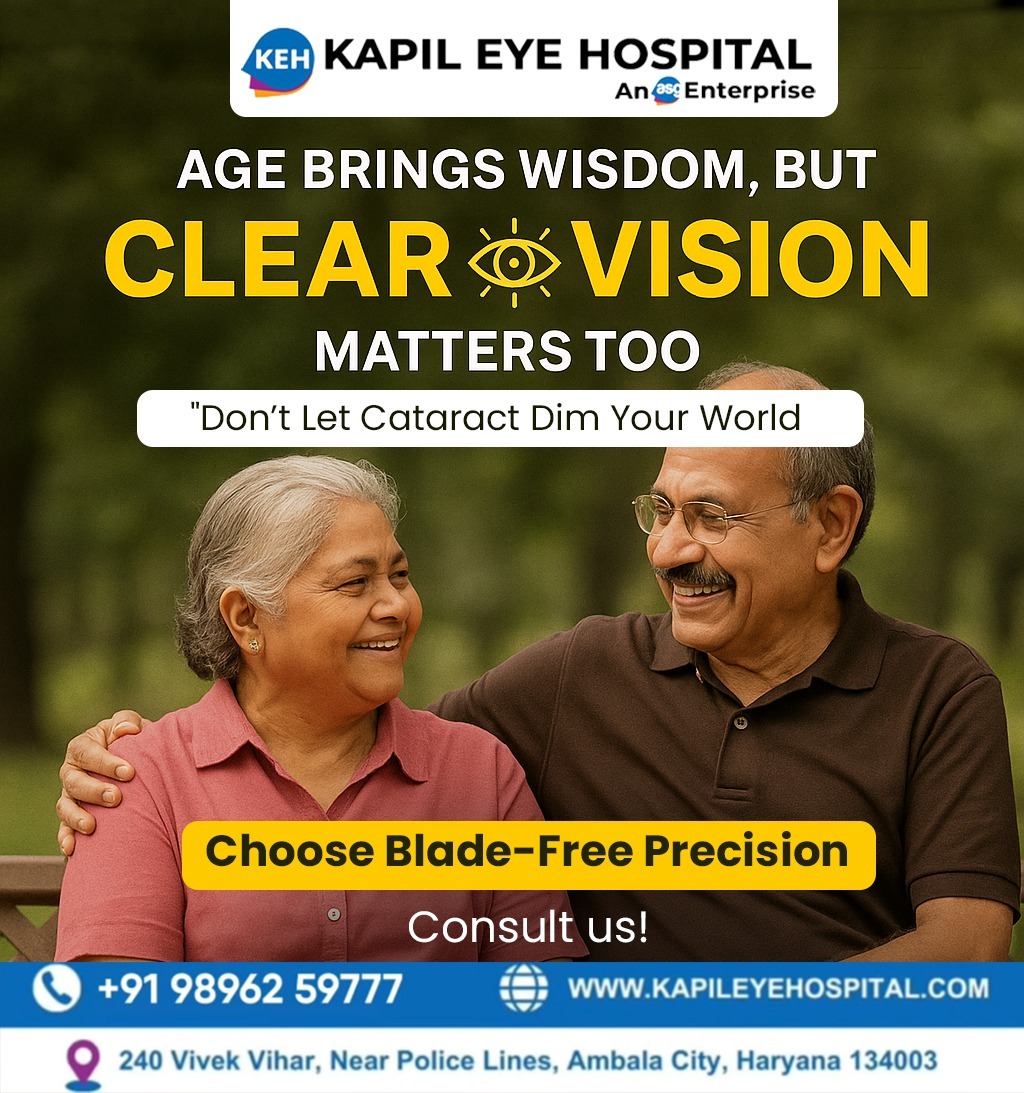Eyes are one of the most important organs in the human body. They help us see the beauty of the world, perform daily activities, and stay independent. However, as people grow older, many start to notice cloudy or blurry vision. One of the main causes of this is cataract — a common eye condition that affects millions every year.
This is where cataract surgery comes in — a simple, safe, and effective treatment that can restore clear vision in just a few minutes.
In this article, we’ll discuss everything about cataract surgery, including symptoms, procedure, recovery, and why Kapil Eye Hospital, a trusted Cataract Hospital in Ambala, is one of the best places to get treated.
What is a Cataract?
A cataract is a condition where the natural lens of your eye becomes cloudy. Normally, this lens is clear and allows light to pass through easily. When a cataract forms, it blocks or scatters light, making your vision blurry or foggy.
Cataracts usually develop slowly and can affect one or both eyes.
Common Symptoms of Cataract
If you have cataracts, you may notice symptoms such as:
- Blurry or cloudy vision
- Difficulty seeing at night
- Faded or yellowed colors
- Sensitivity to bright lights
- Halos around lights
- Frequent changes in your glasses number
If you experience any of these signs, it’s important to visit an eye specialist for an examination. Early detection helps in managing the condition effectively.
What is Cataract Surgery?
Cataract surgery is a medical procedure used to remove the cloudy lens and replace it with a clear artificial lens called an intraocular lens (IOL).
This lens helps restore sharp, bright, and natural vision.
The surgery is typically done under local anesthesia, meaning the patient stays awake but doesn’t feel pain. It is one of the most common and safest surgeries performed worldwide, with a success rate of over 98%.
Types of Cataract Surgery
At advanced eye centers like Kapil Eye Hospital, modern technology is used to make the procedure comfortable and precise. The two most common types are:
- Phacoemulsification (Phaco Surgery)
This is the most common technique. A tiny incision is made, and the cataract is broken up using ultrasonic waves. Then, the cloudy lens is removed, and the new artificial lens is inserted.
The incision heals naturally without stitches, and recovery is fast. - Femtosecond Laser-Assisted Cataract Surgery
This is an advanced and bladeless procedure. A laser performs most of the surgical steps, making it even more accurate and safe.
Patients often experience quicker recovery and clearer vision within days.
Benefits of Cataract Surgery
Modern cataract surgery offers several benefits, including:
- Restored clear vision
- Improved color perception
- Reduced glare and light sensitivity
- Greater independence in daily life
- Enhanced quality of life
Many patients notice significant improvement in vision within 24–48 hours after surgery.
Who Needs Cataract Surgery?
If cataracts begin to interfere with your everyday activities — such as reading, driving, or recognizing faces — your doctor may recommend surgery.
People who suffer from other eye diseases, such as diabetes-related eye changes or retinal problems, should also be evaluated carefully before surgery.
At Kapil Eye Hospital, each patient undergoes a detailed eye check-up to decide the best treatment plan.
Preparing for Cataract Surgery
Before the surgery, your ophthalmologist will:
- Conduct a detailed eye examination
- Measure your eye to select the right lens power
- Review your medical history and any medications you’re taking
Patients are usually advised to avoid eating or drinking a few hours before the procedure and to arrange someone to accompany them home after surgery.
The Cataract Surgery Procedure
The entire procedure generally takes 15 to 30 minutes.
Here’s what happens step-by-step:
- Anesthesia: Eye drops are used to numb the eye.
- Incision: A tiny cut is made to reach the cloudy lens.
- Lens Removal: The cataract is gently broken up and removed.
- Lens Implantation: A clear artificial lens (IOL) is placed.
- Recovery: The incision heals naturally without stitches.
Patients can go home the same day after resting for a short while.
Recovery After Cataract Surgery
After surgery, most patients notice clearer vision within one or two days.
You may experience slight itching or mild discomfort, but this is normal and temporary.
Your doctor may prescribe:
- Eye drops to prevent infection
- Sunglasses to protect your eyes from bright light
- Avoidance of strenuous activities for a few days
Regular follow-ups are important to ensure smooth healing and the best results.
Why Choose Kapil Eye Hospital for Cataract Surgery
Kapil Eye Hospital is one of the most trusted names in eye care and a leading Cataract Hospital in Ambala.
Here’s what makes it stand out:
- Experienced Eye Surgeons: The hospital has skilled ophthalmologists with years of surgical experience.
- Advanced Technology: Uses state-of-the-art laser and phaco machines for safe and precise surgery.
- Personalized Care: Each patient receives individual attention and a customized treatment plan.
- Affordable Packages: Quality eye care at reasonable prices.
- Comprehensive Eye Services: Besides cataract surgery, it is also recognized as a leading Retina Hospital in Ambala, offering treatment for diabetic retinopathy, retinal detachment, and macular degeneration.
At Kapil Eye Hospital, patient comfort, safety, and satisfaction come first.
Role of Retina Care in Cataract Patients
Sometimes, patients with cataracts may also have underlying retina problems.
That’s why it’s important to choose a hospital that offers complete eye care under one roof.
Being a trusted Retina Hospital in Ambala, Kapil Eye Hospital provides advanced retinal imaging, laser treatment, and surgical care for all retinal disorders.
This ensures that every cataract patient gets comprehensive and accurate diagnosis before surgery.
Frequently Asked Questions (FAQs)
1. Is cataract surgery painful?
No, cataract surgery is not painful. The eye is numbed using local anesthesia, so you won’t feel any pain during the procedure.
2. How long does the surgery take?
The surgery usually takes about 15 to 30 minutes. You can go home the same day after a short rest.
3. When will I get clear vision after cataract surgery?
Most patients notice improved vision within 24 to 48 hours, though full clarity may take a few weeks.
4. Can both eyes be operated on the same day?
Usually, doctors perform cataract surgery on one eye at a time, with a short gap between surgeries for each eye.
5. Are there any side effects after surgery?
Minor discomfort, dryness, or itching is normal and temporary. Serious complications are very rare.
6. What type of lens is best for me?
Your eye doctor will suggest the right lens based on your vision needs and lifestyle. Options include monofocal, multifocal, and toric lenses.
7. Can cataracts come back after surgery?
No, cataracts cannot return. However, some patients may develop a condition called “posterior capsule opacity,” which can be easily treated with a simple laser procedure.
8. Why choose Kapil Eye Hospital for cataract treatment?
Because it is a leading Cataract Hospital in Ambala and also known for retina care. The hospital offers expert doctors, advanced equipment, and personalized patient support.
Conclusion
Cataract surgery is one of the safest and most successful eye procedures, giving millions of people clear and bright vision every year.
If you or a loved one are noticing symptoms like cloudy vision or glare, don’t delay. Visit Kapil Eye Hospital, the trusted Cataract Hospital in Ambala and also a reputed Retina Hospital in Ambala, for expert diagnosis and treatment.
With the right care and technology, your vision can be restored — allowing you to see the world clearly again.







